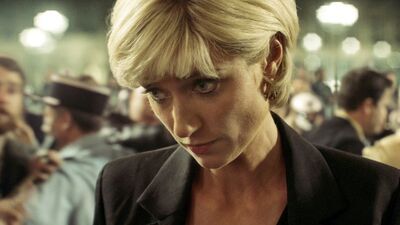A feeling of impending doom looms over these first three episodes, each glimmer of a brighter, more independent future for Diana and Dodi interrupted by the flash of paparazzi cameras or another overbearing phone call from Mou Mou. The second episode, “Two Photographs,” frames the Diana-Charles dichotomy as a public-relations battle between “scandal” and “dignity,” as filtered through the lenses of the two photographers who took famous pics of both days before Diana’s death: Italian paparazzo Mario Brenna, depicted here as an opportunistic sleaze, and stalwart royal photographer Duncan Muir. It’s a highlight of the season, a stark framework with which to explore the show’s thematic battle between reality and perception: Charles keeping up a happy family and the traditions of the state, while Diana dangles from the edge of Dodi’s yacht, a woman on the precipice.

Granted, with only half the season to work with, season six of “The Crown” is more focused and assured than the season prior, if only by fits and starts. It helps that this first stretch holds singular focus on Diana in her last days, a woman scrambling to secure her future and escape the yoke of the very fame that keeps her safe, successful, and influential. However, that comes at the cost of the rest of the cast, with even Charles’ subplots coming across as immaterial in the wake of Diana’s immense gravity. When Diana’s on screen, so the “Simpsons” gag goes, we’re left asking, “Where’s Diana?” It’s a flaw the royal family suffered in real life, so it tracks that the show dramatizing their rapid slide into irrelevance would also turn its focus away from them this drastically.
And what of the one who wears the titular crown? As with season five, Elizabeth gets placed on the back burner, a woman whose character journey is complete and therefore gets little to do but ruminate and lecture. Imelda Staunton remains the least compelling of the Lizzes that came before, but that’s hardly her fault: “The Crown” has been so focused on Diana of late, just like in real life, that Elizabeth’s complexities are overshadowed as a result. Far from the morally fraught beings they were in their earlier seasons, Elizabeth and Philip (a surprisingly gentle Jonathan Pryce) are fixed points; there’s little new to explore about them. As such, they feel like supporting characters in their own series.

